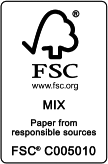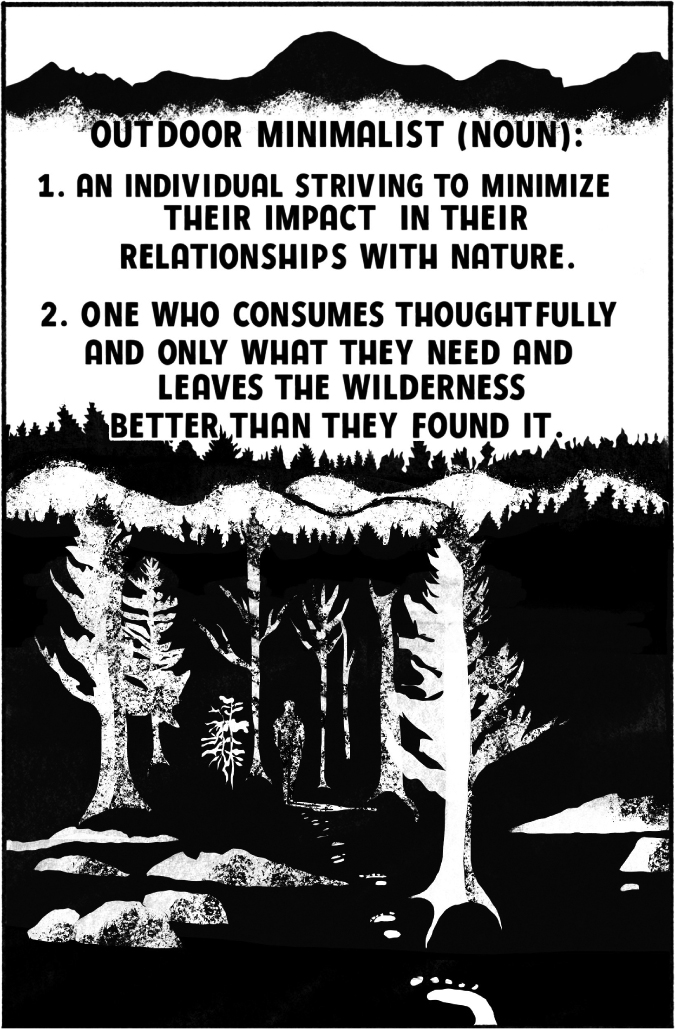An imprint of Globe Pequot, the trade division of
The Rowman & Littlefield Publishing Group, Inc.
4501 Forbes Blvd., Ste. 200
Lanham, MD 20706
www.rowman.com
Falcon and FalconGuides are registered trademarks and Make Adventure Your Story is a trademark of The Rowman & Littlefield Publishing Group, Inc.
Distributed by NATIONAL BOOK NETWORK
Copyright 2022 by The Rowman & Littlefield Publishing Group, Inc.
Illustrations Savannah Cuthbertson
All rights reserved. No part of this book may be reproduced in any form or by any electronic or mechanical means, including information storage and retrieval systems, without written permission from the publisher, except by a reviewer who may quote passages in a review.
British Library Cataloguing in Publication Information available
Library of Congress Cataloging-in-Publication Data
Names: Carney, Meg, 1992 author.
Title: Outdoor minimalist : waste less hiking, backpacking and camping / Meg Carney ; illustrations by Savannah Cuthbertson.
Description: Guilford, Connecticut : Falcon, [2022] | Includes bibliographical references. | Summary: A guide to actionable ways to waste less while hiking and camping and implement low-impact practices in outdoor pursuits Provided by publisher.
Identifiers: LCCN 2022000002 (print) | LCCN 2022000003 (ebook) | ISBN 9781493063994 (paperback) | ISBN 9781493064007 (epub)
Subjects: LCSH: Outdoor recreationEnvironmental aspects. | Outdoor recreationEquipment and supplies. | Low-impact camping. | Waste minimization.
Classification: LCC GV191.6.C374 2022 (print) | LCC GV191.6 (ebook) | DDC 796.5dc23/eng/20220125
LC record available at https://lccn.loc.gov/2022000002
LC ebook record available at https://lccn.loc.gov/2022000003
 The paper used in this publication meets the minimum requirements of American National Standard for Information SciencesPermanence of Paper for Printed Library Materials, ANSI/NISO Z39.48-1992.
The paper used in this publication meets the minimum requirements of American National Standard for Information SciencesPermanence of Paper for Printed Library Materials, ANSI/NISO Z39.48-1992.
The author and The Rowman & Littlefield Publishing Group, Inc., assume no liability for accidents happening to, or injuries sustained by, readers who engage in the activities described in this book.
This book is printed by Forest Stewardship Council certified printers on FSC certified paper.
Contents
Guide
Wilderness is not a luxury, but a necessity of the human spirit.
E DWARD A BBEY
T IME SPENT IN THE WILDERNESS IS NOT EASILY QUANTIFIABLE or defined. Ask any avid outdoors person why they spend their hard-earned money and free time finding a remote slice of forest, river, or desert, and their answers will be as vast and varying as the ecosystems that draw them out.
For me, the wilderness brings an immense sense of belonging I have yet to find in other places beyond myself. Belonging in the wilderness may seem like a foreign concept to some, since for many, wilderness is equivalent to the unknown. I personally have an adverse reaction to ambiguity, but for reasons I cant identify, the wild unknown of nature is different. The dry, red earth of the desert and the fragrant forests of the north are places that humans seemingly have no right to roam, let alone claim they own. Despite this, the inseparable feelings of belonging boil down to connectivity and the freedom you have to simply be: to exist with no external pressure beyond meeting your basic human needs and being present in that very moment.
Theres likely no need for me to explain the wonders of outdoor experiences to you. If youve picked up this handbook, you probably feel drawn to the wonders of the wilderness, even if you cant articulate it. Writing this book, I only realized the purpose of the text after all but this introduction had been written. The idea when I started was to help convince others to become stewards of the environment within the growing world of outdoor recreation. Now that it is all said and done, I still recognize that to be true, but I realize the true purpose of me sharing this with you is to shorten the learning curve for outdoor activitiesto get you more quickly from dreaming to doing.
Ive loved being outside since I was a child, but it wasnt until my late twenties that I began to realize how little I knew about the flora and fauna I spent so much of my life traipsing around in. Looking back on a few of my very first solo trips outdoors, I can pick out nearly every mistake I made, from my choice of rain gear (or lack thereof) to how to pack my bag and an unfortunate lack of planning. For many people, starting a new outdoor hobby takes many trials and errorsI know it did for me. Sometimes, we are fortunate enough to be friends with someone with more experience who can shed some light on the vital aspects of that activity, but for others, it is a journey we take alone.
Each year, interest grows in the many sectors of outdoor recreation. As our trails, public lands, and backroads gain more notoriety, a bit of magic in the wild adventure can be lost among the crowds. While that may be a selfish observation, more people means greater impact on the ecosystems where we seek solace. Part of this is due to lack of education or understanding of how to recreate responsibly. Still, when we think of the impact outdoor recreation has on the environment, it is easy to zero in on trail wear, campsite establishment, vandalism, and litter. While all of these things are important and necessary to be aware of and prevent, they are just a few pieces to a much larger puzzle. Books like No Impact Man, environmental documentaries, and movements like zero-waste have brought many big-picture problems to light for a much larger audience. Despite this, within the outdoor recreation community, it can sometimes feel like the activities we love have become more of an exploitation of wild spaces than a way to protect them. Some activities can even feel quite elitist, building up a barrier to entry that revolves more around materialistic values than the human experience and our relationship with nature and ourselves.
On a backpacking trip a good friend of mine once said, its so alarming that all you really need to live and to be happy, you can carry on your back. In our current consumer culture, it is easy to get caught up in the demands of daily life. We become overwhelmed with the feeling that we need more to be happy. Then, we take a trip out backpacking and realize most of that stuff isnt necessary. We realize most of our daily stresses are somewhat trivial. As outdoor recreation has grown in popularity, though, Ive noticed dramatic changes in how we interact with our outdoor spaces. At times, it feels as if we attempt to bring our entire living room outside instead of truly experiencing the nuances and challenges nature presents us. It is as if the simplicity of enjoying time outside is lost among the noise of gadgets, gear, and social media. Anyone who knows me personally can attest that although I will gladly spend days outdoors, I am not a gearhead. As an outdoor writer, I field questions from friends and family about gear often, and theyre surprised when I am not up to date on all the latest gear technologies and instead prefer to analyze purchases through practicality, quality, and longevity, not the brand name or novelty. While I do write some gear reviews and research gear trends for certain writing assignments, to me, there is a fine line between necessity and the next best model of outdoor equipment.


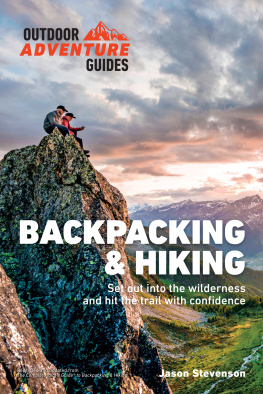
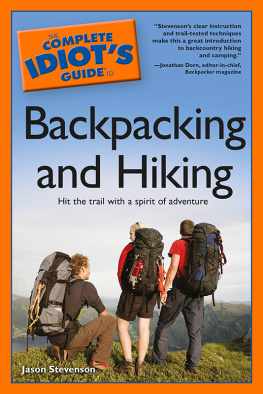
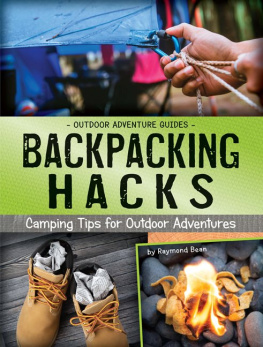
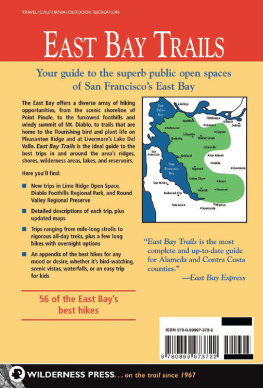
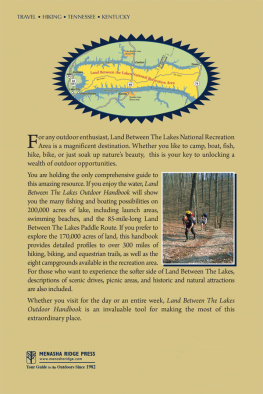


 The paper used in this publication meets the minimum requirements of American National Standard for Information SciencesPermanence of Paper for Printed Library Materials, ANSI/NISO Z39.48-1992.
The paper used in this publication meets the minimum requirements of American National Standard for Information SciencesPermanence of Paper for Printed Library Materials, ANSI/NISO Z39.48-1992.